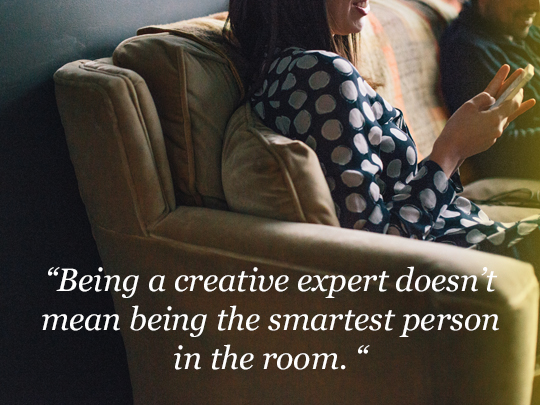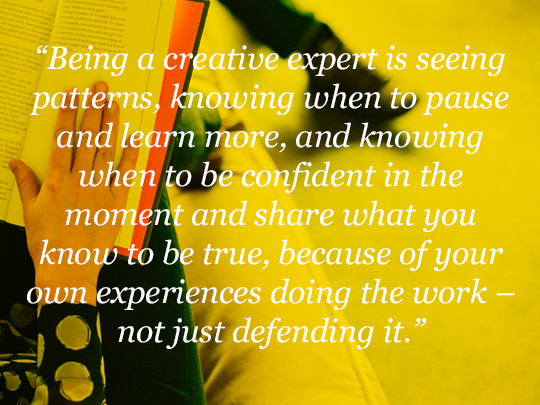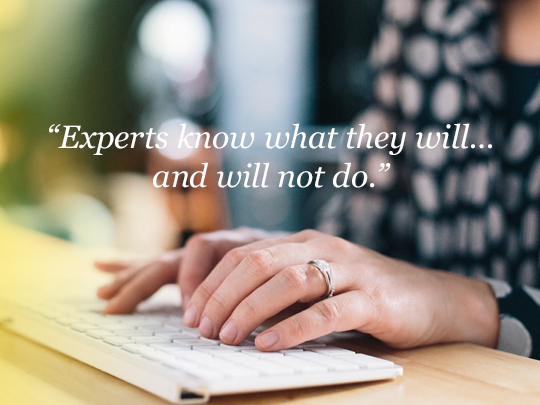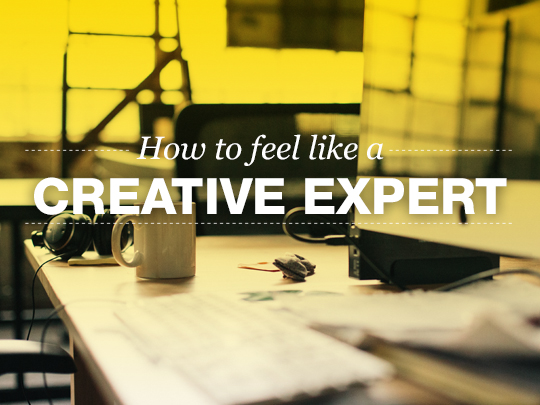Every creative entrepreneur we work with wants to feel like an expert – like a wearing-the-pants and legit-know-my-stuff kind of expert. The kind of expert that doesn’t doubt their decisions and feels like an authority over their craft. These creatives want to feel like the kind of expert that has a roster full of clients who respect their guidance and are never treated like pixel-pushing order takers. Our clients want to feel like the kind of experts who get paid well… like experts.
But what’s interesting is that a majority of our clients balk at the word “expert”. They have a lot of fears and misconceptions around taking on that kind of bold title – that if they start to think of themselves as an expert it means they’ll have to have all the answers or be smarter than everyone in the room. That they’ll be responsible for every problem thrown their way. But that is hardly the case.


Kathleen here, and I want to share a few ways to step into your creative expertise by describing the characteristics I’ve seen in experts I admire:
EXPERTS ARE NEUTRAL
Experts don’t get bent out of shape, defensive, or riled up when they receive criticism – and on the flip side they don’t get too excited or inflated by positive feedback or big wins. Experts are cool, calm, and collected. Not to say they don’t get passionate, fired up, funny or even dramatic, but it’s typically around an exciting idea, method, insight, or point-of-view that they feel strongly about, not about this one piece of work that the client must love, or else pouting and/or shouting ensues.
EXPERTS TAKE A PAUSE
I studied a lot of TED talks before giving my own talk at the Circles Conference, and one thing I noticed is that really great speakers aren’t afraid to pause when they need to collect their thoughts. This is also true for responding to clients in meetings, via email, or deciding whether to commit to a new engagement or opportunity. Experts aren’t afraid to collect the information (or the thoughts) they need before responding. I’m one who likes to immediately respond to questions or fill any silence with the sound of my own voice, so I’m practicing the pause in order to feel a little more like a creative expert in my own work and life.
EXPERTS TRUST THEMSELVES “IN THE MOMENT”
On the flip-side, Tara, my sister and Braid co-creative expert will tell you, that if you abuse the pause, it can become a crutch or replacement for being able to speak your mind and trusting yourself in-the-moment. A creative expert is comfortable in natural flow of a back-and-forth conversation… because they trust themselves (mostly), and know when to ask questions, or admit when they are speaking outside of their creative expertise. For example, during decision-making moments like I mentioned above, the pause can serve you, but sometimes the pause can really kill a dynamic back-and-forth collaboration that’s happening in real time. And, really, shouldn’t your clients feel like collaborators in your process, just as much as you shouldn’t feel like an order taker? Yes. There was no pause before that “yes.”
EXPERTS RECOGNIZE PATTERNS
Experts are able to see patterns and instantly recognize disconnects in their work. This is because they’ve narrowed in on their niche and know their customers so well they could practically be psychics for them. Recognizing patterns is how you are able to either speak-in-the moment or take pause and learn more, especially when something doesn’t quite fit with what your creative experiences have taught you. Recognizing patterns will allow you to create content (blog posts, newsletters, e-courses, and e-books) that will resonate with a broad audience beyond your one-on-one clients, and your readers will question how you “know them so well” or “are in their head” without ever having met them. For example, I’ve recognized that all of my clients want to meditate more – so I’ve included a little bit of meditation guidance in my DIY Coaching for Creatives email sessions and have even touched on it in my blog posts.
EXPERTS HAVE CLEAR BOUNDARIES
Experts know what they will and will not do. They make expectations clear and concise. Experts know how to tell you what you will get when you work with them – they demystify the process so their clients feel reassured investing in their services. Experts show up on time, meet deadlines, and do what they say they’ll do.

EXPERTS CHARGE MORE
Experts charge not only for their time but for their experience. The beauty of charging more upfront is that you rarely feel resentful and tend to over-deliver with pleasure rather than nickel-and-dime your clients when asked for small extras.
EXPERTS SAY NO
Experts aren’t afraid to say no to a project that isn’t the right fit. This is because they respect the prospective client enough to know that someone else could do the job better. They also know it would take up time and energy they could be using to better serve someone with their core genius.
EXPERTS DON’T KNOW (OR DO) IT ALL
And they aren’t afraid to say it. Admitting that you don’t have all the answers is a big display of creative confidence. And there is a lot of integrity to saying “no” to a client or project that isn’t a good fit for what your expertise.
EXPERTS HAVE OPINIONS
If you’re feeling uncomfortable with the word “expert” think of it like this – experts have enough experience to have a point-of-view – they have meaningful opinions and aren’t afraid to speak on them.
So you want to feel more like a creative expert? Start by asking yourself these questions:
- How do I typically react to criticism and feedback? How could my response reflect my expertise?
- Do I really listen to my clients, peers, and creative colleagues or am I just waiting to speak?
- What do all of my clients have in common?
- How could I make my offerings and services more clear? How could I help my potential dream customers feel more reassured with my process?
- Am I being appropriately compensated for the work I’m doing?
- What do I want to be known for?
- How can I show that “specialty” more concretely in my work, my portfolio/case studies/process?
- Fill in the blank: If I could stop doing ________ I would feel more like an expert.

